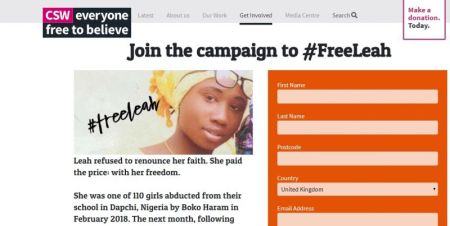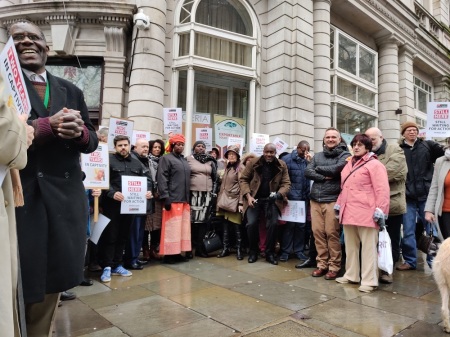Nigeria vows to 'redouble' efforts to free Leah Sharibu 2 years after Boko Haram abduction

Wednesday marks two years since Christian schoolgirl Leah Sharibu was abducted along with 109 of her classmates from her school in northeast Nigeria by a faction of the Islamic extremist group Boko Haram.
Although most of her classmates were later released by the Islamic State West Africa Province — a breakaway group of Boko Haram — Sharibu, then 14 years old, was not. She was reportedly held back from her classmates in 2018 because she refused to recount her faith in Christ.
Despite recent reports that Sharibu married a Boko Haram commander’s son and gave birth to a child, Sharibu’s family and their global supporters have not given up hope that the 16 year old will be freed one day.
In a statement shared with The Christian Post and other media outlets Tuesday, Nigerian President Muhammadu Buhari restated his vow to secure Sharibu’s release.
“Now aged 16, Leah remains in the hands of the terrorists — they say because she refuses to renounce her Christian faith,” Buhari said. “We say, as the government for and of all Nigerians, that no person has the right to force another to change their faith against their will and that all life is sacred.”
Buhari assured that the federal government is continuing efforts to secure Sharibu’s release as well as all other captives of the Borno-based terror factions that have terrorized the Lake Chad region for the past decade.
“[W]e do so regardless of their creed or the name of their creator,” the Muslim president said.
“As we as redouble our efforts for Leah’s return, we can never allow the terrorists to divide us — Christian against Muslim, Muslim against Christian. We are all sons of Abraham. And all Nigerians have the same worth and rights before the law, and before God.”
Despite his vow, Buhari has been criticized by international human rights advocates who say that his words do not match his administration’s actions.
“Just last week, Nigerian President Muhammadu Buhari claimed the Nigerian government is committed to ensuring that every child taken by insurgents will be released. Two years after Leah was taken, the world wants to see action rather than talk,” Dede Laugesen, executive director of the nonprofit organization Save the Persecuted Christians, said in a statement.
Nathan Sharibu, Leah’s father, told Channels Television in an interview Tuesday that it is “due to [the government’s] lapses” that his daughter has spent two years in captivity.
“[Buhari] also promised the nation and almost promised the whole world that his administration will do its possible best to ensure that those in captivity are released,” Nathan Sharibu was quoted as saying. “So, I’m pleading with him now to fulfill his promise; I’m begging him.”
Sharibu's mother, Rebecca, spoke at a protest Wednesday organized by Christian Solidarity Worldwide outside the Nigerian High Commission in London. Rebecca Sharibu delivered a petition to the commission signed by over 12,132 people calling on the Nigerian government to take action.

“Today Leah has spent two years in captivity. We don’t know where Leah is. We don't know the condition or the situation that Leah is in," Rebecca Sharibu said at the protest.
"I'm pleading with [the U.K.] government and with our Nigerian government, with President Buhari ... to fulfill his promises that he has made to me personally, that he is going to rescue Leah and ensure that she is released, and not just Leah, all the others in captivity.”
Cece Heil, senior counsel with the American Center for Law and Justice, said Wednesday that while Buhari’s words are encouraging, “Nigeria’s government has done very little to secure Leah’s release.”
Citing knowledgeable government sources, the Nigerian daily newspaper Vanguard reported this week that the Nigerian federal government made an effort during the early days of Sharibu’s abduction to pay a ransom through a third party to secure Sharibu’s release.
However, the ransom agreement was reportedly rejected by her abductors. In 2018, a friend of the Sharibu family told media outlets that the terrorists demanded the equivalent of $275 million for their daughter’s release.
Ama Onyerinma, the founder of the social change organization Live Abundantly, has also criticized Buhari. Onyerinma told The Guardian that even though there was much media coverage surrounding the news that Sharibu gave birth to a baby earlier this year, there was “no comment from the Nigerian government or any of its related agencies.
“The sinister aspect of this regrettable and despicable tale is that the victims are girls — school girls who were left in the safety of their school compound under the watchful eyes of administrators,” Onyerinma said. “[Y]et terrorists succeeded in violently snatching them from the community and have continued to hold them under coercion.”
Two months after the Dapchi schoolgirl’s abduction in February 2018, the U.N.'s Children's Fund reported that at least 1,000 children had been kidnapped by Boko Haram.
Among those were over 276 schoolgirls kidnapped by Boko Haram in the town of Chibok in 2014. Despite an international #BringBackOurGirls campaign over the past five years, dozens upon dozens of those girls are still missing. Reports had suggested that a number of the schoolgirls kidnapped by Boko Haram had become pregnant.
As for Sharibu, her family has been through many hardships, especially after news reports suggesting that their daughter was killed were followed by reports that she is alive and pregnant.
Last week, Buhari told attendees of a side event of the 33rd African Union Summit in Ethiopia that his government “will not relent until every child, boy or girl, every Nigerian adult in custody of Boko Haram, is freed.” Buhari praised the fact that some of the schoolgirls from Dapchi and Chibok have gained their freedom.
Leah’s parents have founded The Leah Foundation, an organization that advocates for Nigerian girls seeking an education without fear of harm. UNICEF reported in December 2018 that as many as 13 million children in northern Nigeria are not in school, the highest total in the world.
Most of the out-of-school children live in the northern states of Borno, Adamawa and Yobe, where Boko Haram is active. Experts fear that a large number of out-of-school children will impact Nigeria’s economic growth.
“Nigeria’s youth face massive hurdles regarding education, employment and dire poverty,” Laugesen explained. “As we’ve seen in other countries, this means they are ripe for radicalization and vulnerable to violence and abuse. The nation itself is blessed with enormous natural resources, most especially oil, making it a target for terrorist groups and state-actors looking to profit from corruption and chaos.”
STPC, along with the International Committee on Nigeria and other activists, are calling on U.S. President Donald Trump to appoint a special envoy to monitor the situation in Nigeria and the Lake Chad Region.
“The United States must get ahead of this burgeoning crisis of international concern with grave national security implications,” Laugeson stressed. “If Nigeria unravels, the fallout will be felt worldwide. The appointment of a trusted, experienced diplomat as a U.S. special envoy to Nigeria and the Lake Chad region is a good place to start.”
The Nigerian government has also faced international criticism for what has been labeled an ineffective response to the increasing violence carried out by Boko Haram factions and Fulani radical attacks. Insecurity has led to Nigeria becoming one of the most dangerous countries to live in the world.
As Nigeria ranks as the 12th-worst country in the world on Open Doors USA’s 2020 World Watch List of countries where Christians are most severely persecuted, Nigeria was added to the U.S. State Department’s special watch list of countries that tolerate or engage in severe violations of religious freedom in December.





















